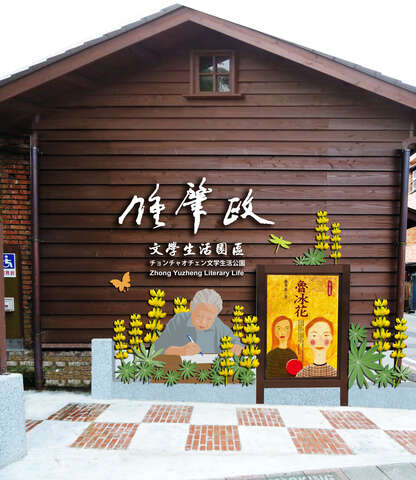Zhong Zhao Zheng Literary Life Park Introduction
The establishment history of the Chang Chao-Tung Literary Life Park began in 2012, with the historic buildings of Longtan Elementary School's Japanese dormitory complex and Longtan Martial Arts Hall. After historical research and studies initiated by the Taoyuan County Government's Cultural Affairs Bureau, as well as the establishment of a residency program and design planning, it was officially named the "Chang Chao-Tung Literary Life Park" in 2015. The park's development is centered around the literary works of National Treasure author Chang Chao-Tung (reverently referred to as Elder Chang), with literary landscapes as branches and leaves, extending and reshaping the close relationship between Longtan and post-war Taiwanese literature through the lens of a contemporary ecological museum. On April 20, 2019, the Chang Chao-Tung Literary Life Park opened in the presence of Elder Chang, accompanied by the surrounding business district and scenic slow travel, which increased the demand for guided tours. Therefore, in 2021, the Hakka Affairs Bureau of Taoyuan City Government and the Taoyuan Hakka Cultural Foundation jointly organized the "Follow the Footsteps of Literature to Explore Longtan - Longtan Literary Landscape Walk and Guide Training," hoping to attract those interested to engage in guiding literary landscape walks, telling the stories of literary landscapes in a multi-dimensional way, and enhancing the emotional connection with the land. The park's concept is "the entire Longtan is our Literary Life Park," aiming for close integration with the local area, not only marketing Longtan through literature and promoting tourism value but, more importantly, allowing the public to rediscover the joy of reading and seek the warmth of the land through the words of Taiwanese literature. The Mother of Taiwanese Literature: Chang Chao-Tung from Longtan In the 1950s, the literary scene was filled with anti-communist literature due to the political atmosphere, and local writers were heavily suppressed. Chang Chao-Tung struggled to write from the thorny path, using his native land, Taiwan, as his flesh and blood. With a cypress desk purchased by his beloved wife, he carved out his grand literary creations. He once mentioned that as a literary writer, he naturally had the responsibility to write about the historical sufferings endured by Taiwanese people, which became the core goal of his lifelong commitment to constructing "Taiwanese Literature." In 1957, he initiated the publication "Literary Friends Newsletter" by inviting like-minded literary creators, aiming to unite local writers, and held irregular gatherings to solidify fellowship. In 1960, he published "Lŭbīnghuā" in the supplement of the United Daily News, marking Chang Chao-Tung's official ascent to the literary peak after ten years of honing his craft, encouraging his literary friends to unite in seizing this literary territory. Since then, Chang Chao-Tung has nurtured generations of literary talent like a mother river, and he set an example by writing major works like the "Polluted Stream Trilogy," "Taiwanese People Trilogy," "High Mountain Suite," and "Raging Waves," becoming the first to pioneer the writing of Taiwanese river novels, preserve indigenous memories, and promote multilingual creativity. In addition, he supported the literary publication "Taiwan Literature" for many years and presided over the supplemental section of the Minzhong Daily, aiming to provide a clean, free, and experimental space for literary newcomers to unleash their creativity. Beyond his literary achievements, Chang Chao-Tung also became involved in the Hakka movement and democracy movement in his later years, making significant contributions to preserving Hakka culture. Throughout his life, he wrote nearly 20 million words and is the most awarded writer in Taiwan, earning the title of "Mother of Taiwanese Literature." His home in the old Japanese dormitories of Longtan Elementary School, where he completed many important works, is even referred to as the "Birthplace of Post-War Taiwanese Literature," attracting numerous literary enthusiasts to pay homage. On May 16, 2020, Chang Chao-Tung peacefully passed away in his sleep at the age of 96, prompting countless literary friends domestically and abroad to mourn; on the 18th, President Tsai Ing-wen visited the memorial service at Longtan Martial Arts Hall to pay her respects, praising him as "not only Elder Chang of the literary world but also Elder Chang of Taiwan." From the vast body of writing left by Chang Chao-Tung, we can understand the development process of post-war Taiwanese literature and glimpse his unfinished imagination of "Taiwanese Studies," all rooted in his deep love for the land of Taiwan. The giant has departed, but his words and ideals will surely endure. (Source: Official website of Chang Chao-Tung Literary Life Park)







































